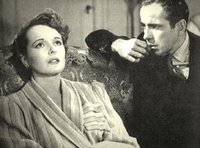
I read in many genres, but one thing that stays consistent throughout all the genres I read is that I like there to be many, many dark moments.
I like it when I read something and I get that scared whoosh in the pit of my stomach as one of the book’s characters does or says something that moves them irrevocably towards a terrible end (although it’s not irrevocable, is it, since this is a romance, and we have an HEA. But at that moment it seems irrevocable).
I think that’s why I like Mary Balogh so much; her dark moments are so agonizingly painful for one or both of the characters. It’s too easy, as a writer, to want to keep things easy for your characters; after all, you created them, you like them, and they feel like friends (not to be all woo-woo, but that’s how I feel, at least).
But as writers, we have to make things difficult, or the ultimate payoff won’t be as sweet.
Some of my favorite authors–Anne Stuart, Stacia Kane, Karen Marie Moning, George R.R. Martin (still waiting for the payoff there), our own Carolyn Jewel, Brent Weeks–are amazing at tearing their characters apart as they try to reach some form of happiness.
Do you like the superdark moments in books? Which authors do it the best?
I received the author copies of A Not So Reputable Gentleman? last Friday, and there is nothing like seeing the book in its tangible form. Even ebook-Kindle-loving me savors holding the book in my hands and flipping through its pages.
I’ll do an “official” introduction to the book near its release date of July 24, but revisiting the book after several months reminded me of some of the essential elements of the story.
My hero and heroine were secretly betrothed before the book begins. Secret betrothals, while favored in fiction (e.g. Edward Ferrars and Lucy Steele in Sense and Sensibility; Frank Churchill and Jane Fairfax in Emma), were frowned upon in the real Regency world. In fact, it was considered a serious moral lapse.
Unmarried men and women in society were not permitted to be alone together and were expected to meet only in carefully chaperoned circumstances, like balls and other society parties.
Before a betrothal, young men and women were forbidden to use each other’s Christian names. They could not correspond by letters. They could not exchange gifts. They could not touch in any kind of intimate way and certainly could not kiss.
My hero and heroine had broken nearly all these taboos, although they, of course, considered themselves betrothed. In public, however, any show of particular attention or lapse of correct behavior would have given them away. Society was quick to assume a serious attachment on any sign of particular attention between a couple.
A secret engagement typically meant that there were reasons parents would not approve of the match. During the Regency a parent’s approval was expected if the child was under 21 years of age. Parents naturally wished for socially and financially secure marriages for their children. At the time of my book’s beginning, my hero was neither financially secure or socially acceptable.
By the 1800s a betrothal became more of a gentleman’s word than a contract between families. Even though suing for breach of contract was no longer the norm, a gentleman was expected to keep his word if he asked a woman to marry. A gentleman was disgraced if he broke an engagement and his fiancee was considered damaged goods. The lady was the only one who could “cry off” but then she was considered a jilt.
This, of course, makes great fodder for Regency Romance Novels. In reality, it is what led Wellington to marry Kitty Pakenham. When Kitty had been young and vivacious Wellington had courted her, but his suit was not accepted by her family. When he returned from India, Kitty had become pale and sickly, but Wellington realized that she had considered them betrothed all that time. He felt duty-bound to marry her as a result.
A secret betrothal held no such protections for the couple. By its secrecy, words–and hearts–could be broken without any social cost, although the emotional cost could be enormous.
In matters of marriage, the Regency was, like in so many areas, a time of change. In the 17th and 18th century society marriages were arranged by the parents and were secured for financial gain or rise in social status. By the Regency, couples wished to marry for love. Some blamed this foolish notion on the reading of novels.
 Do you like secret betrothals in Regency romances? What about arranged marriages?
Do you like secret betrothals in Regency romances? What about arranged marriages?
If you would like a chance to win a copy of A Not So Reputable Gentleman?, enter my part of the Harlequin Historical Authors Summer Beach Bag Giveaway. For more chances at other prizes and the grand prize of a Kindle Fire, enter daily. See details here.
So last week I mentioned I was reading Amor Towles’s Rules of Civility, and there were some comments about how beautiful the cover of this book is. I decided I had to share it here since a) The cover really is totally gorgeous (and was what grabbed my attention in the first place) and b) The book itself was so amazingly good. I read it in a couple of days and wanted it to go on longer.
It’s set in 1937, and has a very Fitzgerald-y feeling to the prose (one reviewer called it a “throwback” novel, which it is in the best sense of the word–very atmospheric, full of characters doing glamorous things with a dark underpinning and having witty conversations). It opens in 1937, among the upper society of New York City, and is narrated by Katy Kontent, a young woman working in publishing and pulling herself up from a lower-class Russian Brighton Beach upbringing. She and her friend Eve, out carousing in jazz clubs on New Year’s Eve, meet a handsome young banker named Tinker Gray, you think the story is heading one way, then–well, it doesn’t. It’s almost Regency-esque in its complicated and detailed view of a very specific world. I loved it.
I am always looking for books set in the 1920s and 1930s, such a rich setting that isn’t seen much in romance (though I think it definitely should be!). I did one Undone short story set in the ’20s,The Girl in the Beaded Mask, and I would love to do more…
Right now I’ve started reading Sadie Jones’s The Uninvited Guests, since I’m still in a 1930s mood. What have you been reading lately? Do you like books set in this time period??

The world of Jane Austen scholarship was shaken to the core by the recent discovery of a “lost” excerpt from Pride and Prejudice. Currently undergoing rigorous handwriting, paper, and ink analysis, the fragment reveals a daring stylistic experimentation that has already created fierce controversy in academic circles. The short scene depicts Jane Bennett, who, while waiting for Lizzie to return from Derbyshire, seeks outside help in rescuing Lydia from ruin. With the violent rejection of the classical style,what was Austen intending? One cannot help but wonder, had she pursued this course, how the introduction of a new character, a possible rival for either Bingley or Darcy, would have influenced the romantic element of the novel; and certainly it seems, in its revelation of the seamy underbelly of Meriton, to indicate a possible bloody gang shoot-out as the book’s climax.
It is with great pleasure and the deepest honor that the Risky Regencies Blog presents the world debut of this important addition to the Austen canon.
She’s cool as a cucumber, this Miss Bennett. Not what I expected, not after what I’d heard in the village about the family. She receives me in a drawing room furnished with old-world stuff–nothing fancy, old pieces, the whole set-up breathing respectability and solidity.
“Thank you for coming, sir.” She gestures to a chair, one of those spindly English things. The old dame who took my hat and gloves stays with us in the room, picking away at an embroidery frame to preserve the decencies, I guess.
When Miss Bennett leans to pour tea her gown slips up revealing a pretty good ankle. Not bad, not bad at all, but this is business, and I let her mess around with the teacups while keeping an eye on her. She’s too genteel to offer me a Scotch, but for the moment I’m playing on her terms.
“The weather has been quite remarkably good,” she offers, and the slight tremor in her hand reveals her agitation. “I think, however, we can expect some rain later this week.”
I decide to help her out. “Sure. Say, Miss Bennett, you didn’t call me here to talk about the weather.”
“You are correct, sir.” She produces a small, lace-edged handkerchief and gives a genteel sniffle. “I daresay you have heard…how could you not have…the disgrace that has fallen upon our family. Forgive me, it is dreadful indeed. My youngest sister, Lydia, has…has fallen into the hands of an adventurer and has been persuaded to elope. I think he does not intend to marry her. Sir, you must help us find them.”
“Wickham?” I ask. Things had gotten too hot for him in London, after he’d fallen out with the boys at White’s, and the whole set up stinks of him. He’d tried to set up a rival operation to Bingley and Darcy, but they were too clever for him, and they’d left town after they’d sucked the neighborhood dry. Even so, they’d forced Charlotte Lucas to throw in her lot with the de Bourgh Gang and last I’d heard she was engaged in a struggle for power with Collins.
“I fear so.” She plies the handkerchief, a picture of bewildered innocence. “My Papa and Mama are prostrated with grief, and I do not know to whom I can turn until Lizzie comes home.”
Right, her father operating some sort of scam from his study and her hophead of a mother high as a kite most of the time from all I’ve heard, continually sending her daughters into town to buy more of the stuff at that fake haberdasher’s. “Lizzie?”
“My sister. She will know what to do. She is in Derbyshire, and on her way home even as we speak.”
“Up north?” This stinks more and more. If the Wordsworth siblings, that cold-hearted team of killers, are part of the scheme, there’ll be blood all over this polite drawing-room before we’re finished.
“It is dreadful indeed.” She dabs at her eyes.
“You’re good, sister. Real good.”
“I beg your pardon?” She draws herself up and looks at me with disdain.
“You’re good, real good, all that fake innocence, but I’ve been made a sap of one too many times by dames like you. It’s time to come clean, dollface.”
“Sir!” She leaps to her feet, doing the heaving bosom thing. “I regret we will have no need of your services. Please leave this house immediately, Mr. Spade.”